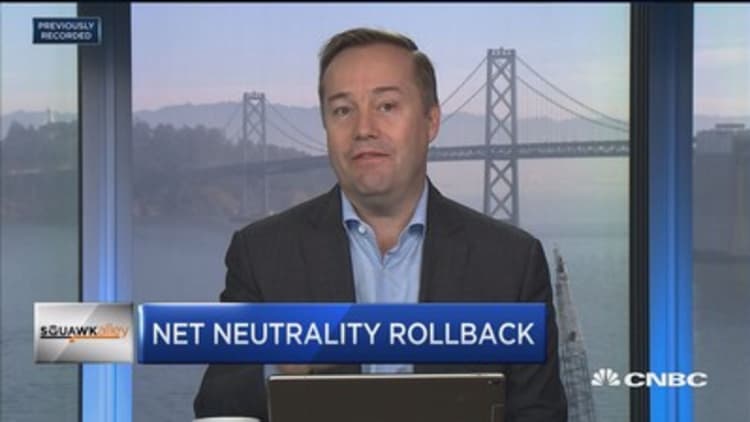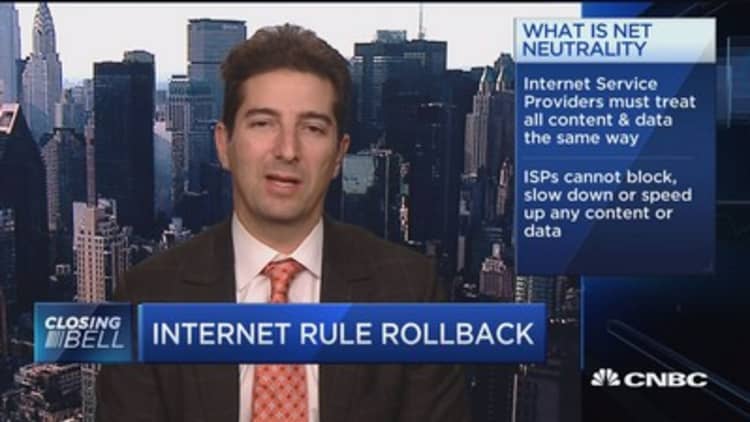A new proposal could weaken federal oversight of internet service providers by rolling back net neutrality regulations — a change that makes sense to tech investor and Donald Trump critic Mark Cuban.
Cuban reiterated his criticism of net neutrality regulations on Wednesday, tweeting that the existing rules give the president the keys to the entire internet.
Federal Communications Commission Chairman Ajit Pai said on Tuesday that the agency was reviewing a drafted proposal to replace existing net neutrality regulations. Pai's proposal would roll back Obama-era rules that prevented internet service providers like Verizon, AT&T, Charter or CNBC owner Comcast from changing the delivery speed and availability of specific internet content. A replacement plan would lift many of the federal regulations but maintain a mandate of transparency, Pai said.
Cuban referred Twitter followers to his previous critiques on net neutrality regulation. He argued that private companies weren't really harmed by the state of the internet prior to the Obama-era rules, and thus would be unlikely to be harmed by rolling the rules back.
Cuban has been an outspoken critic of Trump but has favored some policies associated with both the political left and the political right.
Cuban made his name by building and selling online streaming company Broadcast.com during the dot-com boom. Cuban, unlike most of Silicon Valley, has maintained for years that private companies should compete for promotion on the internet — not depend on FCC rules to mediate the entire ecosystem.
The Internet Association, which counts companies like Amazon, Google and Facebook as members, opposed Pai's proposal.
"Consumers have little choice in their [internet service provider], and service providers should not be allowed to use this gatekeeper position at the point of connection to discriminate against websites and apps," said Michael Beckerman, president and CEO of the Internet Association, in a statement on Tuesday.

Jason Calacanis, another prominent technology investor, spoke out against Pai's proposal on Wednesday. On CNBC's "Squawk Alley," Calacanis questioned whether big telecom companies could be trusted to be transparent and maintain a level playing field for all content.
"When you get on the internet, if you don't have net neutrality, they're going to throttle certain services that are not their's," Calacanis said. "So Verizon, which as you know, now has Yahoo, might make Google slower, or they could even charge you to access Google. And a company like Netflix or YouTube, they would be killed by Verizon — they would be killed by AT&T and Comcast. ... You cannot trust large companies to do the right thing."
Verizon told CNBC it remains committed to an open internet and that it would not block or throttle lawful content. Comcast reiterated sentiments from a Tuesday blog post: "[W]e do not and will not block, throttle, or discriminate against lawful content – and we will be transparent with our customers about these policies."
The White House, AT&T, Netflix and Google did not immediately respond to a request for comment, but Google is part of the Internet Association, and Netflix said on Tuesday that it opposed the FCC proposal.
In a Tuesday blog post, AT&T wrote: "Make no doubt, the circulation of this order will bring the 'sky is falling' crowd to the fore, and they will foretell a day when websites will be blocked, content censored and internet access controlled by ISP overlords. Such claims, while great for fundraising, are as nonsensical now as they were a decade ago when they were first prophesied."
Disclosure: CNBC owns the exclusive off-network cable rights to "Shark Tank," which features Mark Cuban as a panelist.
WATCH: Winners/losers in net neutrality



